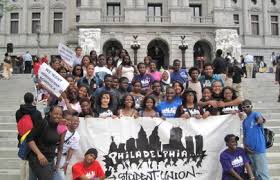Adopting a Land Value Tax Like Pittsburgh
By Dr Stuart Jeanne Bramhall
I have been extremely impressed to see Philadelphia’s students, teachers, parents and churches organizing at the grassroots level. Their demand? That Republican governor Tom Corbett restore $629 million he cut from the school district budget (to transfer to privately run charter schools). However given the massive amount of debt the city and school district are incurring to keep public schools open, I can’t help but think Parents United For Public Education, the Philadelphia Student Union, and other clergy and activist groups might be making the wrong demand. The track record of other states in forcing governors to backtrack on austerity cuts and school privatization is extremely poor. Thus I think it makes more sense for Philadelphia’s growing school reform movement to demand changes they can achieve – namely tax reform that shifts the tax burden from small business and low and middle income residents to the banks, real estate developers, and land speculators who own the bulk of the city’s real estate.
Until a week ago, it was unclear whether Philadelphia’s public schools would even open this fall. According to the corporate media, they have been “saved” at the last minute by a $50 bailout from the city of Philadelphia, money the city will borrow on the “financial markets” (i.e. Goldman Sachs). This debt is on top of a $300 million bond the school district floated last year, adding substantially to the district’s $280 million in annual debt payments. Despite all this borrowing – and closing 23 schools in April – on September 9 students will have school buildings to go to, but no administrators, school secretaries, counselors, librarians, textbooks, school nurses, paper, or pens. Moreover, at least one school is asking parents to front up with $613 per student
The Debt Trap
This cycle of continuous borrowing is a trap a lot of cities fall into owing to the gross unfairness of municipal tax structures. Philadelphia’s local taxes include a city income tax, sales tax, and business and occupation tax. This is on top of a property tax weighted towards land improvements. All tax low income residents and small businesses more heavily than wealthy banks and real estate developers and speculators. The same is true of most US cities, which is the major reason they have incurred massive debt to maintain crumbling infrastructure and schools. This is a no-win situation, as debt repayment to banks and bondholders captures an ever bigger share of city and school budgets.
Pittsburgh’s Land Value Tax
Pittsburgh, in contrast, derives most of its municipal funding from a Land Value Tax. Pittsburgh’s LVT taxes the value of unimproved land at five times the rate of homes and business operations built on that that land.
The concept of Land Value Tax – of taxing real estate values rather than structural improvements – is very old. Adam Smith first proposed it in 1776 in the Wealth of Nations. San Francisco journalist Henry George became world famous in 1879 by expounding on Smith’s ideas in Progress and Poverty. This book, which should be required reading by every economics graduate, was deliberately suppressed in the US by J.D. Rockefeller, JP Morgan, Ezra Cornell, and the railroad barons who funded the major American universities. Contrary to popular misconception, America’s corporate elite derive the vast majority of their wealth from their monopolization of land and natural resources. According to Walter Rybeck in Re-Solving the Economic Puzzle, 95% of privately held land is owned by 3% of Americans.
The property tax structure in most cities rewards landowners to engage in real estate speculation and to keep land and foreclosed homes empty. It also rewards slumlords not to undertake upgrades and repairs in their tenements. This is because any land improvements result in a property tax increase.
Countries and Cities Which Have Adopted an LVT
George turned out to be much more famous overseas than in the US. Countries which adopted a variation of LVT (Hong Kong, Singapore, Taiwan, Denmark and numerous jurisdictions in Australia and New Zealand) have all thrived – mainly owing to their ability to fund infrastructure maintenance and schools without incurring debt. Experience has been similar in US cities and regions which have implemented an LVT. These include California’s Central Valley, Fairhope Alabama, and Arden Delaware.
According to the Center for the Study of Economics, Pittsburgh, Harrisburg and 15 other Pennsylvania towns and cities presently employ a type of LVT to fund city services. Last year Montreal adopted a version of LVT by doubling the tax rate on parking lots. Other communities looking at adopting an LVT include New London, Connecticut, Lanesborough Massachusetts, and Portland Oregon.
For a great video explaining how Land Value Tax works to reduce debt, fund schools and infrastructure, and end real estate speculation and boom and bust cycles, check out the video Real Estate 4 Ransom:
[youtube XL3n59wC8kk]
Dr. Bramhall is a retired American child and adolescent psychiatrist, activist and political refugee in New Zealand.
Her first book The Most Revolutionary Act: Memoir of an American Refugee describes the circumstances that led her to leave the US in 2002. She has also published two young adult novels about political activism: The Battle for Tomorrow: A Fable
View All Books by Dr. Bramhall >>>
She is involved in the national leadership of the New Zealand Green Party and has a political blog at StuartJeanneBramhall.com
ATTENTION READERS
We See The World From All Sides and Want YOU To Be Fully InformedIn fact, intentional disinformation is a disgraceful scourge in media today. So to assuage any possible errant incorrect information posted herein, we strongly encourage you to seek corroboration from other non-VT sources before forming an educated opinion.
About VT - Policies & Disclosures - Comment Policy




